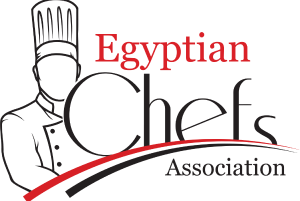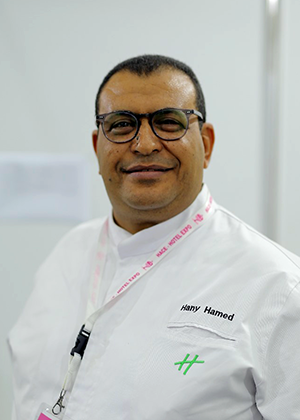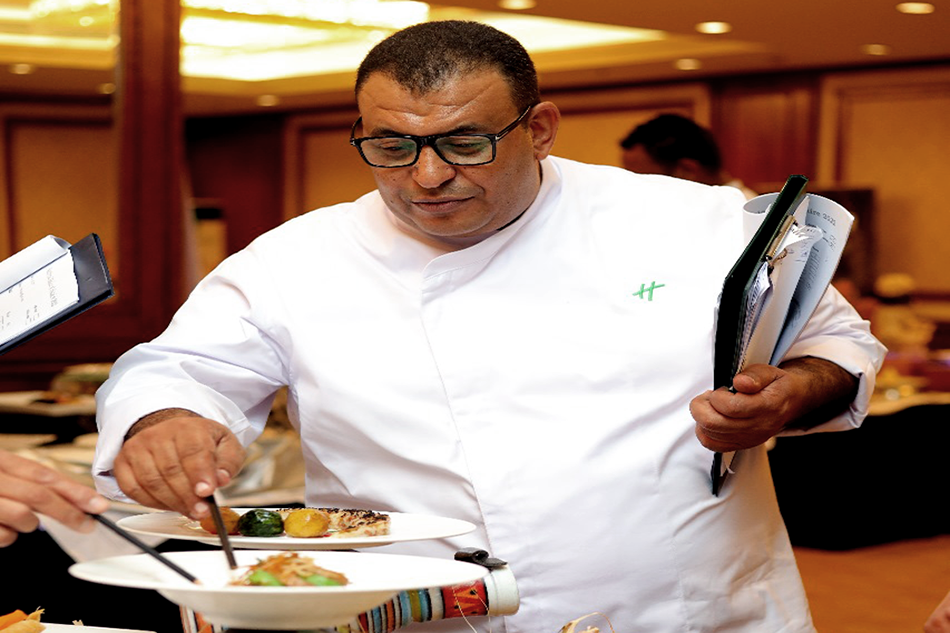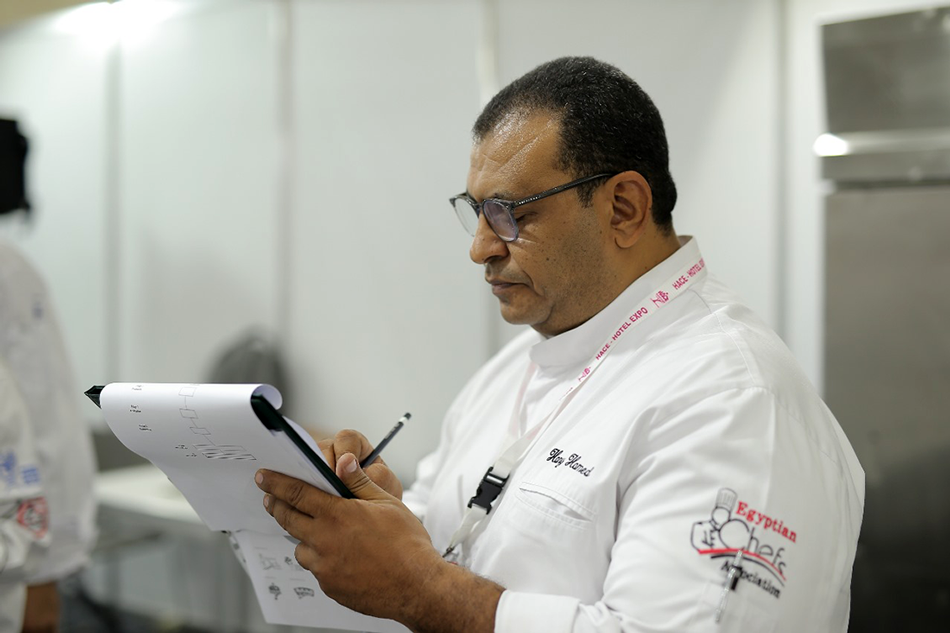

Interviews

Born in Cairo, Chef Hany Hamed discovered his interest and passion for the culinary arts at a young age. He embarked on his culinary journey by studying at the Cairo School of Tourism and Hotels, honing his distinctive style. Throughout his extensive career, he contributed his expertise to renowned establishments such as Le Meridien Heliopolis, Cairo Pyramids, Conrad Cairo, Royal Meridien Cairo, Grand Hyatt, and InterContinental Citystars Cairo. Currently, Chef Hany holds the position of Executive Chef at the Holiday Inn Citystars Hotel.
In 2000, Chef Hany Hamed earned recognition when the Egyptian Chefs Association appointed him as a key member of the National Chefs Team, representing Egypt at the IKA Culinary Arts Olympics. During the competition, the Egyptian team achieved notable success, securing two bronze medals and a silver medal. In 2006, he was selected by the Association to participate in a prestigious food exhibition held in Paris, France. Following this, in 2008, Chef Hany received a nomination from the Egyptian Chefs Association to serve as one of Egypt’s culinary ambassadors, representing the country at the 2008 IKA Culinary Arts Olympics in Germany. He further showcased his culinary prowess by participating in the Culinary Arts Festival in Turkey in 2010.
Chef Hany’s involvement extended beyond competitions; he served as a member of the jury for the 2015 National Salon Culinaire Competition and captained the ECA competitions at the HACE 2019 Exhibition.
Curious about Chef Hany’s perspectives on competitions and his approach to the evolving landscape of the hotel sector, the Egyptian Chefs Association engaged in an interview with him to delve into his insights.
This year’s competitions demonstrate significant improvement compared to last year, featuring innovative concepts and a heightened emphasis on the spirit of challenge. For instance, in the steak competition, participants are tasked with preparing a steak accompanied by a specific type of starch and a complementary sauce. This requirement showcases broader culinary skills and encourages chefs to unleash their creativity.
In hotel management, we benefit from the IHG Academy program, a collaborative initiative with various Egyptian universities, both governmental and private. This program provides training for students from different universities who work as trainee chefs in our group’s hotels, eventually transitioning to roles within the chain. This is particularly crucial as we encounter challenges with new chefs who, despite showcasing enthusiasm on social media platforms like Instagram and Facebook by posting pictures of dishes, may believe they are sufficiently trained and resist starting their career ladder from the beginning. In reality, individuals who commence their careers from scratch provide a solid foundation for our team.
The culinary profession demands a significant number of chefs. For instance, during the last Ramadan, we catered to various locations, including the Baron’s Palace and the Museum of Civilization. The Holiday Inn Citystars alone prepared meals for approximately 22,000 people, underscoring the need for trained chefs and reliable expertise.
Regarding recognition and consequences, we highly value individuals who display respect and skills. Those who excel can be acknowledged through promotion lists, employee of the month awards, and other forms of recognition. Conversely, for any lapses, we follow a progressive approach, beginning with verbal warnings and escalating to written warnings. We actively present our suggestions to the administration, which then makes the necessary decisions.

Navigating the current scenario is exceptionally challenging due to the substantial and ongoing increases in the prices of essential raw materials. For instance, discussions with a meat supplier revealed the urgency of immediate decisions due to the ever-changing prices; I must commit to quantities on the same day to secure pricing stability for subsequent operations. The volatility extends to staple items like rice and sugar, which can suddenly vanish from the market only to reappear with significant price hikes. To address this, we’ve adopted a strategic approach, proactively storing a three-month supply to mitigate the impact of sudden shortages. However, this strategy compels us to make substantial payments within a short timeframe.
In terms of fruits and vegetables, we prioritize sourcing from reliable local suppliers to ensure consistently high-quality ingredients. Collaborating with local companies offers advantages such as direct communication about product quality, with suppliers informing us of any variations and suggesting suitable alternatives. The paramount consideration in dealing with these local companies is the consistency of the quality they provide, a key factor that aligns with our operational objectives.
We conduct a cost study every three months, and our menu prices are regularly adjusted accordingly. However, there are instances where, upon completing the price adjustments and printing menus, we encounter unexpected increases exceeding 25%. Consequently, we are compelled to revisit and re-price the items, placing a burden on our operations to prevent any unforeseen impact on profit margins. At our hotel, we diligently review prices every three months to ensure ongoing financial stability.
Establishing a positive work environment necessitates a solid scientific foundation and an effective motivational system. At City Stars Hotels Group, we prioritize employee development through structured training courses designed to foster a positive relationship. These courses are structured across three levels: managers, assistants, and senior employees and supervisors. Having completed training for managers and assistants, we are currently focused on training supervisors. This training equips them with strategies for effectively engaging with employees, particularly those facing challenges in the morning, such as low energy due to commuting difficulties.
We emphasize the importance of leaving personal problems at the hotel’s entrance, encouraging employees to concentrate on their work and the tasks at hand. Given the sensitivity and focus required in our line of work, this approach is crucial. Notably, we handle catering responsibilities for critical entities such as the World Health Organization office, Maersk International Transport and Shipping Company, and Orange Company. Achieving this level of service has been the result of dedicated efforts from my team.
Comments from customers can vary, encompassing both positive and negative perspectives, as each individual perceives the food experience from their unique standpoint. At our establishment, we hold a respectful regard for all viewpoints. Occasionally, customers may offer feedback on the performance of our service staff, and in some instances, their comments may be motivated by a desire for complimentary items or influenced by personal challenges they are facing. This scenario is more prevalent, especially during the morning hours. Despite such challenges, we make sincere efforts to address issues amicably.
We actively engage with constructive feedback, taking serious opinions into consideration. This approach is integral to our commitment to enhancing the overall level of service and continuously improving the products we offer.

I would advise them to focus on reading, particularly culinary books rather than relying solely on online sources. Embrace learning and stay updated on the latest trends in the culinary world. In the initial stages, emphasize patience and diligence, recognizing that financial gains may not be immediate. Prioritize education and knowledge as the foundation for personal growth and career support; success and financial rewards will follow. I also encourage them to prioritize training, hands-on practice, and the ability to make independent decisions. These elements will not only nurture their career development but also set them on the path to long-term success.